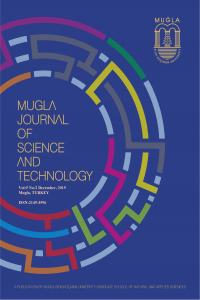INVESTIGATION OF THE PHYSICAL PROPERTIES OF POLYLACTIC ACID (PLA) BASED MELTBLOWN NONWOVENS FOR AGRICULTURAL APPLICATIONS
Öz
Bu çalışmada PLA
bazlı meltblown dokusuz yüzeylerin tarımsal uygulamalar için fiziksel
özelliklerinin araştırılması için bir ön araştırma yapılmıştır. Numunelerin
hava geçirgenliği, kalınlık, gramaj, biyobozunurluk ve elyaf çapı özellikleri
incelenmiştir. Çevreye zarar vermeden kullanılmaya uygun PLA bazlı dokusuz
yüzeyler elde edilmiştir. Bu tür biyoplastik dokusuz yüzeyler çeşitli tarımsal
uygulamalarda kullanılabilmektedir. Bu araştırmada elde edilen numuneler doğal ortamlarda
ekolojik koşullarda biyolojik olarak parçalanırken, tarım tekstillerinde
kullanım için uygun hava geçirgenliği, kalınlık ve gramaj değerleri
sağlamıştır. Bu araştırmada 5.8-10.5 μm'lik dokuma olmayan biyoplastik meltblown yüzeyler
elde edilmiştir.
Bu makalede sunulan
araştırmanın sonuçları, belirli bir tarımsal uygulamanın seçiminde kullanılacak
ve böylece seçilen ürün türünde ürün geliştirme için kapsamlı bir araştırma
yapılacaktır.
Proje Numarası
14-MÜH-018
Kaynakça
- [1] Arslan, K. “Teknik Tekstiller Genel ve Güncel Bilgiler” (Report no. 58), 2009. Retrieved from MUSİAD website: http://www.musiad.org.tr/F/Root/Pdf/Ara%C5%9Ft%C4%B1rma%20Raporlar%C4%B1/Ara%C5%9Ft%C4%B1rma%20Raporlar%C4%B1/Teknik_Tekstil_Raporu_.pdf.
- [2]Mecit, D., Ilgaz, S., Duran, D., Başal, G., Gülümser, T. and Tarakçıoğlu, I., “Technical textiles and applications (Part 2)”, Tekstil ve Konfeksiyon, 17(3), 154-160, 2007.
- [3]Erten, S., “Çevre eğitimi ve çevre bilinci nedir, çevre eğitimi nasıl olmalıdır”, Çevre ve İnsan Dergisi, 65(66), 1-13, 2004.
- [4]Alkan, M., “Biyoplastik Malzeme Kullanılarak Yassı Damla Sulama Borusunun Geliştirilmesi”, Doctoral dissertation, 2013.Retrievedfrom:https://tez.yok.gov.tr/UlusalTezMerkezi/tezSorguSonucYeni.jsp.
- [5]Demirci, B. “Biyoplastikler ve biyobozunabilirlik”, SubconTurkey, 74(7), 2010.Retrievedfrom:http://www.subconturkey.com/2010/Haziran/koseyazisi-Biyoplastikler-ve Biyobozunabilirlik.html.
- [6]Üner, İ. and Koçak, E. D., “Poli (laktik asit)’in kullanım alanları ve nano lif üretimdeki uygulamaları”, İstanbul Ticaret Üniversitesi Fen Bilimleri Dergisi, 11(22), 79-88, 2012.
- [7]Sztajnowski, S., Krucińska, I., Sulak, K., Puchalski, M., Wrzosek, H., and Bilska, J., “Effects of the artificial weathering of biodegradable spun-bonded PLA nonwovens in respect to their application in agriculture”, Fibres&Textiles in Eastern Europe, 20, 6B(96), 89-95, 2012.
- [8]Hablot, E., Dharmalingam, S., Hayes, D. G., Wadsworth, L. C., Blazy, C., and Narayan, R., “Effect of simulated weathering on physicochemical properties and inherent biodegradation of PLA/PHA nonwoven mulches”, Journal of Polymers and the Environment, 22(4), 417-429, 2014.
- [9]Feng, J., “Preparation and properties of poly (lactic acid) fiber melt blown nonwoven disordered mats”, Materials Letters, 189, 180-183, 2017.
- [10]Okamoto, M., “Biodegradable polymer/layered silicate nanocomposites: a review”, Journal of IndustrialandEngineeringChemistry, 10(7), 1156-1181, 2004.
- [11]Blackburn, R. (Ed.), Biodegradable and sustainable fibres, Taylor & Francis US, 2005.
- [12]Duran, K., Dokusuz yüzeyler, Teknik Fuarcılık Yayınları, İzmir, 2004.
- [13]NPTEL, IIT Delhi, Polymer-extrusion based technologies: Meltblown technology, 2012. Retrieved from: https://nptel.ac.in/courses/116102014/10.
INVESTIGATION OF THE PHYSICAL PROPERTIES OF POLYLACTIC ACID (PLA) BASED MELTBLOWN NONWOVENS FOR AGRICULTURAL APPLICATIONS
Öz
In this paper, a
preliminary research was conducted to investigate some physical properties of
PLA based meltblown nonwovens for agricultural applications. Air permeability,
thickness, basis weight, biodegradability and fiber diameter properties of the samples
were investigated. PLA based nonwovens that are suitable to be used without
damaging the environment were obtained. Such bioplastic nonwovens can be used
in various agricultural applications. The samples obtained in this research
provided suitable air permeability, thickness and basis weight values for use
in agricultural textiles, while being biologically degradable in ecological
conditions in natural environments. Bioplastic
meltblown nonwoven of 5.8-10.5 μm were obtained in this research.
The results of the
research presented in this paper will be used for the selection of a specific
agricultural application and thus extensive research will be conducted for
product development of the selected product type.
Anahtar Kelimeler
Biodegradable polymer PLA bioplastic agricultural textiles meltblown method ecological nonwovens
Destekleyen Kurum
Ege University Directory of Scientific Research Projects
Proje Numarası
14-MÜH-018
Teşekkür
This study was supported by BAP (Directory of Scientific Research Projects) of Ege University through the project number 14-MÜH-018.
Kaynakça
- [1] Arslan, K. “Teknik Tekstiller Genel ve Güncel Bilgiler” (Report no. 58), 2009. Retrieved from MUSİAD website: http://www.musiad.org.tr/F/Root/Pdf/Ara%C5%9Ft%C4%B1rma%20Raporlar%C4%B1/Ara%C5%9Ft%C4%B1rma%20Raporlar%C4%B1/Teknik_Tekstil_Raporu_.pdf.
- [2]Mecit, D., Ilgaz, S., Duran, D., Başal, G., Gülümser, T. and Tarakçıoğlu, I., “Technical textiles and applications (Part 2)”, Tekstil ve Konfeksiyon, 17(3), 154-160, 2007.
- [3]Erten, S., “Çevre eğitimi ve çevre bilinci nedir, çevre eğitimi nasıl olmalıdır”, Çevre ve İnsan Dergisi, 65(66), 1-13, 2004.
- [4]Alkan, M., “Biyoplastik Malzeme Kullanılarak Yassı Damla Sulama Borusunun Geliştirilmesi”, Doctoral dissertation, 2013.Retrievedfrom:https://tez.yok.gov.tr/UlusalTezMerkezi/tezSorguSonucYeni.jsp.
- [5]Demirci, B. “Biyoplastikler ve biyobozunabilirlik”, SubconTurkey, 74(7), 2010.Retrievedfrom:http://www.subconturkey.com/2010/Haziran/koseyazisi-Biyoplastikler-ve Biyobozunabilirlik.html.
- [6]Üner, İ. and Koçak, E. D., “Poli (laktik asit)’in kullanım alanları ve nano lif üretimdeki uygulamaları”, İstanbul Ticaret Üniversitesi Fen Bilimleri Dergisi, 11(22), 79-88, 2012.
- [7]Sztajnowski, S., Krucińska, I., Sulak, K., Puchalski, M., Wrzosek, H., and Bilska, J., “Effects of the artificial weathering of biodegradable spun-bonded PLA nonwovens in respect to their application in agriculture”, Fibres&Textiles in Eastern Europe, 20, 6B(96), 89-95, 2012.
- [8]Hablot, E., Dharmalingam, S., Hayes, D. G., Wadsworth, L. C., Blazy, C., and Narayan, R., “Effect of simulated weathering on physicochemical properties and inherent biodegradation of PLA/PHA nonwoven mulches”, Journal of Polymers and the Environment, 22(4), 417-429, 2014.
- [9]Feng, J., “Preparation and properties of poly (lactic acid) fiber melt blown nonwoven disordered mats”, Materials Letters, 189, 180-183, 2017.
- [10]Okamoto, M., “Biodegradable polymer/layered silicate nanocomposites: a review”, Journal of IndustrialandEngineeringChemistry, 10(7), 1156-1181, 2004.
- [11]Blackburn, R. (Ed.), Biodegradable and sustainable fibres, Taylor & Francis US, 2005.
- [12]Duran, K., Dokusuz yüzeyler, Teknik Fuarcılık Yayınları, İzmir, 2004.
- [13]NPTEL, IIT Delhi, Polymer-extrusion based technologies: Meltblown technology, 2012. Retrieved from: https://nptel.ac.in/courses/116102014/10.
Ayrıntılar
| Birincil Dil | İngilizce |
|---|---|
| Konular | Mühendislik |
| Bölüm | Makaleler |
| Yazarlar | |
| Proje Numarası | 14-MÜH-018 |
| Yayımlanma Tarihi | 11 Aralık 2019 |
| Yayımlandığı Sayı | Yıl 2019 Cilt: 5 Sayı: 2 |


